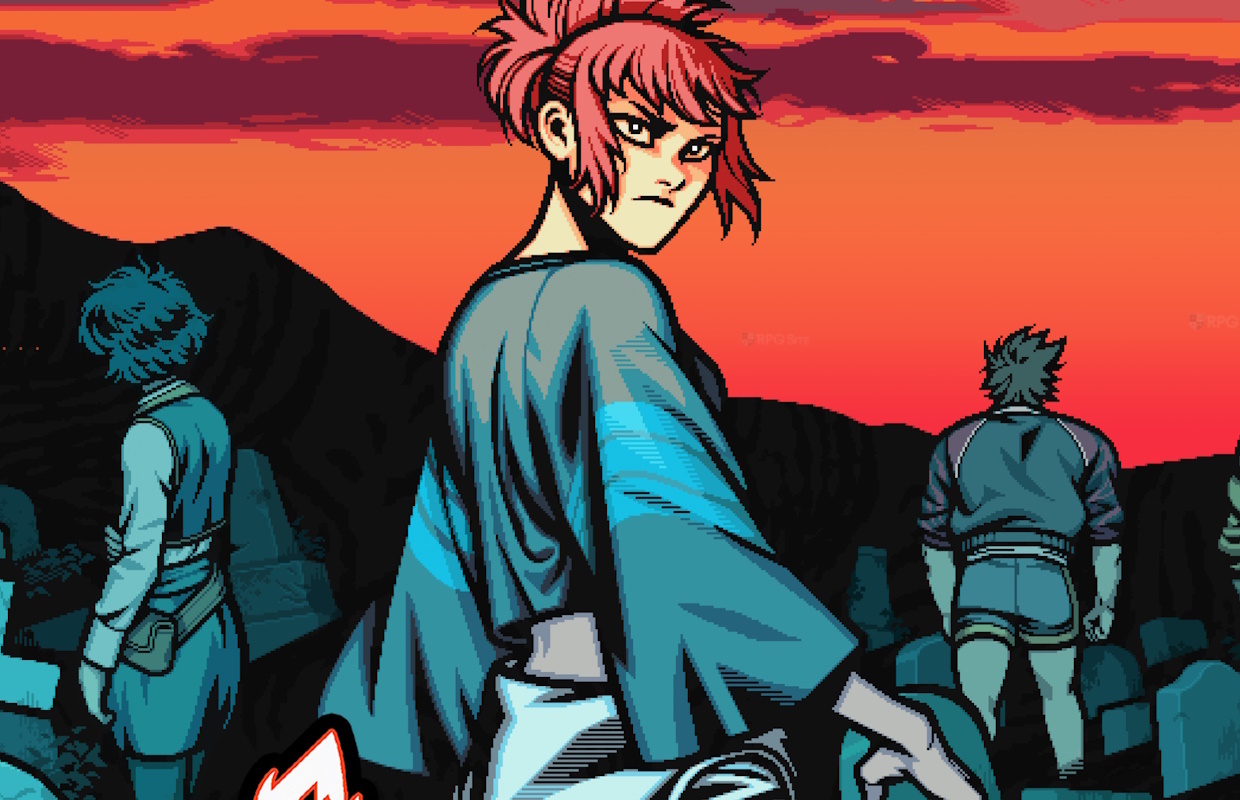
Sometimes a game feels like it was made just for you, drawing on all your favorite nostalgic movies and shows but still feeling new and exciting. Demonschool is one of those games. It evokes a lot of beloved media from the past twenty-five years without ever feeling like a simple imitation – it’s just plain fun!
The game puts you in the role of college students who also happen to be demon hunters. They arrive at a strange island university where saving the world quickly becomes as important as keeping up with their studies. It strongly evokes the feel of early 2000s shows like Buffy the Vampire Slayer and Daria, with a visual style reminiscent of classic Persona games. From the start, the professors seem suspicious, young people start turning up dead, and the sarcastic, unconventional students are clearly hiding painful pasts. It really captures the vibe of a beloved, but cancelled, early 2000s WB show – and I’m completely enjoying it.
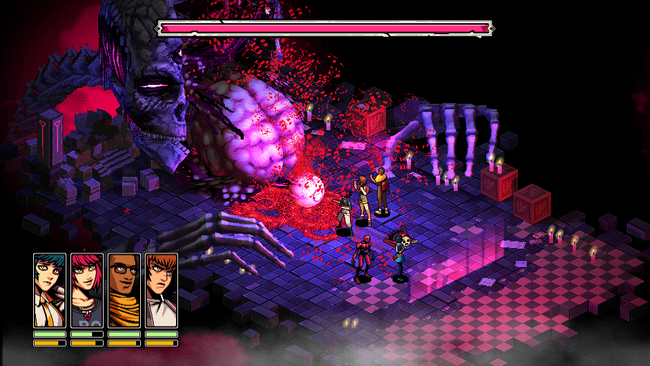
Demonschool is a strategic RPG that continually evolves, and its willingness to take risks is what prevents it from simply feeling like a copy of other games. It uses familiar tropes – like episodic monster hunts and witty, self-aware dialogue – but blends them in a way that keeps things feeling new. The game’s isolated island campus immediately establishes a unique atmosphere, and the story fully embraces this setting. Secrets and mysteries are hidden in surprising locations – from courtyards and forgotten classrooms to the strange, unrealistic parts of the school.
The game features a compelling cast of characters, both heroes and villains, largely comprised of college students caught up in a supernatural mystery. The story begins with Frey, who seems well-versed in the world of demons and the supernatural, as she starts her college life. She soon pulls her more hesitant classmate, Namako, into the strange events unfolding on campus. As they progress, they team up with a variety of new allies, each with unique skills and strengths that prove valuable in combat.
The characters feel unique and individual, not like typical stereotypes. Dialogue is sharp and engaging, and the writing maintains a clever tone without becoming overly sweet. The game draws clear inspiration from classic horror, like a quest to find a dangerous VHS tape, but it avoids relying on obvious, nostalgic references. Instead, these inspirations are cleverly integrated with humor and unexpected twists, allowing players to enjoy them while also appreciating the game’s originality.
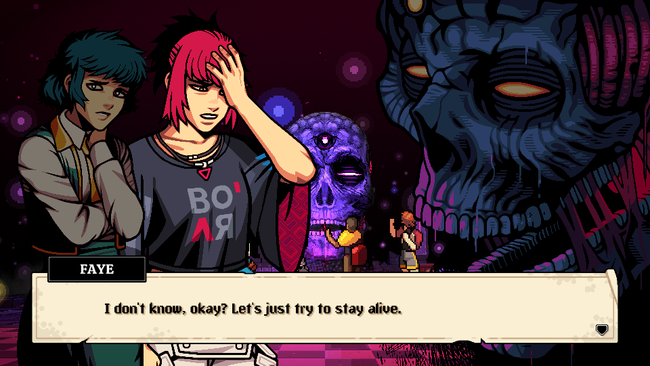
Demonschool clearly takes inspiration from the style of Persona, particularly in its sharp, angled artwork and surreal visuals. However, Demonschool isn’t just a copy; it adds a darker, more intense feel. The use of vivid, often clashing colors creates a strange and unsettling atmosphere, which fits perfectly with the game’s setting – a university bordering Hell.
The game features vibrant, striking environments – eerie greens for mysterious settings, intense reds for demonic scenes, and pale purples for ghostly nights. It creates a dreamlike, surreal atmosphere on campus. Even the menus fit the horror theme, with a jagged, glitchy design that keeps you feeling the presence of the supernatural.
The game’s art style perfectly complements its quirky sense of humor. Characters trade sarcastic barbs, even as things get wildly chaotic, and defeated enemies explode in a comically over-the-top fashion. This reminded me of a similar visual effect in the classic PlayStation strategy RPG, Vandal Hearts. While it could have easily become too silly, Demonschool skillfully balances its lighthearted moments with genuinely creepy horror.
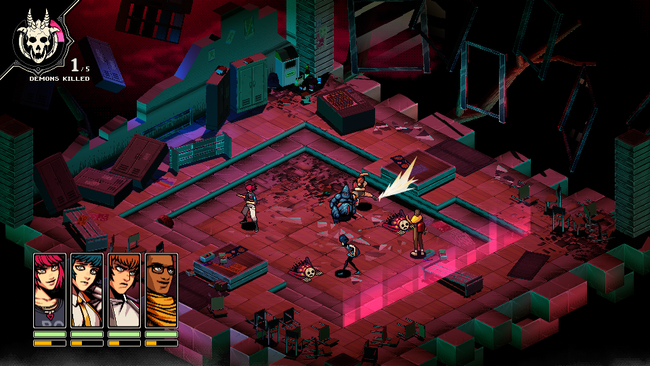
Demonschool offers a unique approach to tactical RPG combat. Battles happen on a grid, and each character brings something different to the fight. You’ll have powerful damage dealers alongside support characters who can stun enemies, boost allies, and take advantage of elemental weaknesses. The elemental system is particularly interesting, going beyond the typical fire, water, and lightning to include combinations like rust and blood, leading to some surprisingly strange and effective strategies.
The game might seem a bit overwhelming when you start, but you’ll quickly understand how it works. Combat isn’t just simple fighting – it’s more like solving a puzzle with each turn. You won’t earn experience or level up characters, but you’ll have plenty of ways to customize and improve your team and resources. It’s thrilling to figure out how to get through each battle, especially the challenging boss fights, which are impressive events on their own.
Let me tell you, combat isn’t a cakewalk in this game. You can’t just muscle your way through fights because everyone has pretty low health. Forget about grinding to overpower your enemies – it just doesn’t work. You have to really think things through, planning several turns ahead and carefully positioning your party. One wrong move and your whole team can get wiped out super fast. Honestly, I’m constantly using the rewind feature to undo mistakes – it’s a lifesaver and lets me try again without restarting the whole battle!
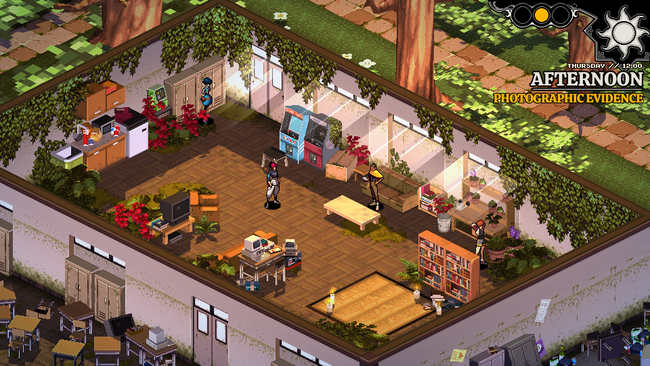
The way this game is built around puzzles reminded me of Paper Mario: The Origami King. Each challenge feels like it has a clever solution the designers want you to discover. It’s really enjoyable to figure out what they’re thinking and then either solve the puzzle as intended or find a creative workaround. When a plan comes together just right, it’s incredibly rewarding.
Demonschool excels by surprisingly mixing its core gameplay with short, engaging minigames and opportunities to build relationships with other characters. These moments aren’t just fun diversions; they add depth to the world, flesh out the personalities of those within it, and even reveal more about the game’s story. You might find yourself helping a student organize a club, investigating odd sounds in the dorms, or even venturing into a demon’s bizarre dreamscape. These interactions give each character a chance to stand out, and the game clearly prioritizes developing a memorable cast.
The music is the highlight of the game. Electronic sounds create a mysterious atmosphere during city exploration, and intense battle music heightens the excitement. The soundtrack is fantastic on its own, but it truly makes the game world feel immersive. The sound design is equally impressive, using eerie effects like pulsing demonic sounds, sharp snaps, distorted static, and rattling bones to create a chilling mood.
It’s wonderful to finally play something so well-made and unified. The game’s music, art, interface, story, and animations all work perfectly together, creating a visually striking experience that’s as creative and original as the horror games that inspired it.
Demonschool is engaging because it respects your intelligence. It avoids excessive hand-holding or relying on tired retro tropes. You’re meant to figure things out and enjoy the experience. Instead of repetitive battles, you’ll find combat that feels like a clever puzzle, and unlocking all the different endings is a real treat. Honestly, the most frightening part is just how much fun it is.
9
We tested Demonschool on PlayStation 5. It’s also playable on PlayStation 4, Xbox Series X|S, Nintendo Switch, and PC.
Read More
- All Golden Ball Locations in Yakuza Kiwami 3 & Dark Ties
- NBA 2K26 Season 5 Adds College Themed Content
- Hollywood is using “bounty hunters” to track AI companies misusing IP
- What time is the Single’s Inferno Season 5 reunion on Netflix?
- He Had One Night to Write the Music for Shane and Ilya’s First Time
- Gold Rate Forecast
- Mario Tennis Fever Review: Game, Set, Match
- Brent Oil Forecast
- Exclusive: First Look At PAW Patrol: The Dino Movie Toys
- EUR INR PREDICTION
2025-11-20 09:57